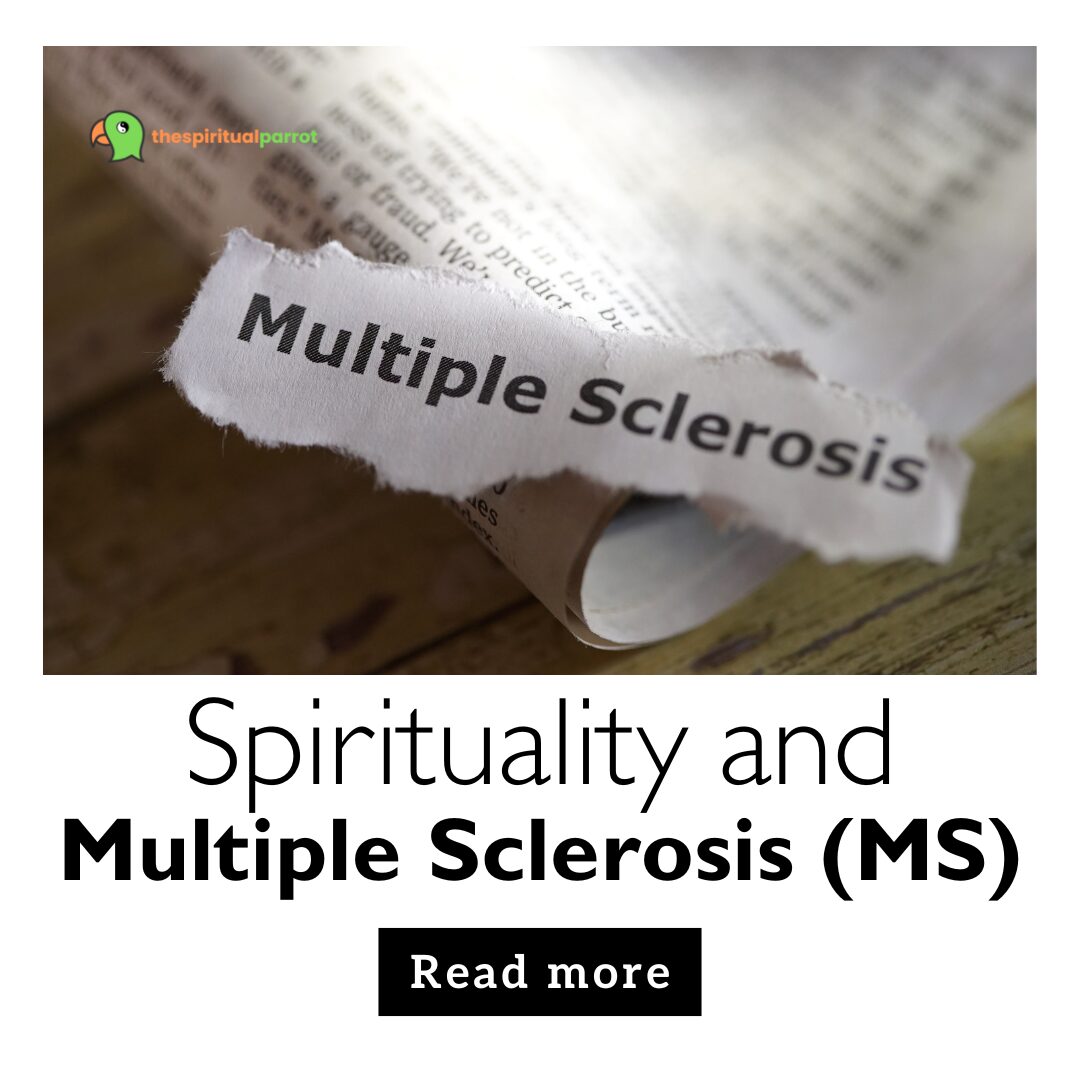Living with multiple sclerosis (MS) can be a challenging journey, both physically and emotionally. But what if there’s more to this condition than meets the eye? In this article, we’ll explore the intriguing intersection of Multiple Sclerosis and spirituality, delving into the profound meanings that lie beneath the surface.
Understanding Multiple Sclerosis (MS) and Spirituality
Multiple sclerosis is a chronic autoimmune disease that affects the central nervous system, causing a range of symptoms such as fatigue, numbness, difficulty walking, and cognitive impairment. Here’s a closer look at the key aspects of Multiple Sclerosis (MS):
- Autoimmune Dysfunction: Multiple Sclerosis occurs when the body’s immune system mistakenly attacks the myelin sheath, the protective covering of nerve fibers in the brain and spinal cord.
- Symptom Variability: Symptoms of MS can vary widely from person to person and can fluctuate in severity over time.
- Diagnosis and Treatment: Diagnosis of MS typically involves a combination of medical history, neurological exams, and diagnostic tests such as MRI scans. While there is currently no cure for Multiple Sclerosis, various treatments and therapies aim to manage symptoms and slow disease progression.

Overview of Spiritual Beliefs and Practices
Spirituality encompasses a broad range of beliefs, practices, and experiences that explore the deeper meaning of life and connection to something greater than oneself. Here are some key aspects to consider:
- Diverse Perspectives: Spiritual beliefs can vary greatly among individuals and cultures, including religious traditions, philosophical outlooks, and personal interpretations.
- Inner Exploration: Spiritual practices often involve inner reflection, meditation, prayer, or mindfulness techniques aimed at cultivating inner peace, harmony, and spiritual growth.
- Sense of Connection: Many people find solace and meaning in spirituality by connecting with a higher power, nature, the universe, or the collective human experience.
The connection between Health and Spirituality
There is growing recognition of the intricate relationship between physical health and spiritual well-being. Here’s how spirituality can influence health outcomes:
- Stress Reduction: Spiritual practices such as meditation, prayer, or yoga have been shown to reduce stress levels, which can have a positive impact on overall health and well-being.
- Enhanced Resilience: Spirituality provides a source of strength and resilience in coping with life’s challenges, including chronic illnesses like Multiple Sclerosis. A sense of purpose and meaning can help individuals navigate difficult circumstances with greater ease.
- Mind-Body Connection: Emerging research suggests that spiritual practices may positively influence the mind-body connection, promoting healing and recovery processes.
By exploring the connection between Multiple Sclerosis and spirituality, we open ourselves to a deeper understanding of the human experience and the potential for healing and transformation.

The Mind-Body Connection in Multiple Sclerosis
Now that we’ve laid the groundwork, let’s delve deeper into the intricate relationship between the mind and body in the context of multiple sclerosis (MS). Understanding this connection is crucial for exploring the spiritual dimensions of Multiple Sclerosis (MS) and its impact on overall well-being.
Exploring the Mind-Body Connection
The mind-body connection refers to the complex interplay between our thoughts, emotions, beliefs, and physical health. In the case of multiple sclerosis, this connection becomes particularly significant due to the chronic and unpredictable nature of the condition. Here’s a closer look at how the mind and body influence each other:
- Psychological Factors: Emotional stress, anxiety, and depression are common among individuals living with Multiple Sclerosis. These psychological factors can exacerbate symptoms and contribute to disease progression.
- Neurological Pathways: The brain and central nervous system play a central role in both physical and emotional processes. Disruptions in neurological pathways can impact mood, cognition, and physical functioning.
- Biopsychosocial Model: The biopsychosocial model of health recognizes the interconnectedness of biological, psychological, and social factors in influencing health outcomes. This holistic approach emphasizes the importance of addressing all aspects of a person’s well-being.
Impact of Stress and Emotions on MS
Stress is a significant trigger for Multiple Sclerosis symptoms and exacerbations. When we’re stressed, the body releases hormones like cortisol and adrenaline, which can weaken the immune system and increase inflammation. For individuals with Multiple Sclerosis (MS), managing stress is essential for maintaining overall health and reducing the risk of flare-ups. Here’s how stress and emotions can affect MS:
- Increased Inflammation: Chronic stress can lead to elevated levels of inflammation in the body, which can worsen MS symptoms and contribute to disease progression.
- Symptom Exacerbation: Stressful situations can trigger or worsen symptoms such as fatigue, pain, and mobility issues in individuals with MS.
- Emotional Resilience: Cultivating emotional resilience through mindfulness, relaxation techniques, and positive coping strategies can help individuals better manage stress and reduce its impact on MS symptoms.
Role of Spiritual Practices in Stress Reduction
Spiritual practices offer powerful tools for managing stress and promoting overall well-being. Whether through meditation, prayer, or connecting with nature, these practices can help individuals find inner peace and resilience in the face of adversity. Here’s how spirituality can support stress reduction in MS:
- Mindfulness Meditation: Mindfulness meditation involves paying attention to the present moment with openness and acceptance. Research has shown that mindfulness-based interventions can reduce stress, anxiety, and depression in individuals with Multiple Sclerosis.
- Prayer and Reflection: For many people, prayer and reflection provide a sense of comfort, hope, and connection to something greater than themselves. Engaging in spiritual practices can offer solace and strength during challenging times.
- Connecting with Nature: Spending time in nature can have a calming and grounding effect on the mind and body. Whether it’s taking a walk in the park, gardening, or simply gazing at the stars, nature has a way of soothing the soul and reducing stress levels.
By recognizing the profound influence of the mind-body connection and incorporating spiritual practices into daily life, individuals with MS can cultivate greater resilience, peace, and well-being.
The Spiritual Interpretation of Illness
As we continue our exploration of the spiritual meanings of Multiple Sclerosis (MS), it’s essential to consider how illness is perceived and interpreted from a spiritual perspective. By examining the deeper significance of illness, we can gain valuable insights into its impact on the mind, body, and spirit.
Historical Perspectives on Illness and Spirituality
Throughout history, illness has been viewed through various cultural, religious, and philosophical lenses. These perspectives offer diverse interpretations of the meaning and purpose of illness in human life. Here are some historical insights to consider:
- Ancient Healing Traditions: Ancient healing traditions, such as Ayurveda, Traditional Chinese Medicine, and Indigenous healing practices, often emphasize the interconnectedness of mind, body, and spirit in maintaining health and wellness.
- Religious Beliefs: Many religious traditions attribute illness to spiritual causes, such as sin, karma, or divine punishment. Healing rituals, prayers, and sacred texts offer guidance and support for individuals facing illness.
- Philosophical Reflections: Philosophers throughout history have pondered the nature of suffering and its relationship to human existence. From Stoicism to Existentialism, philosophical perspectives offer existential insights into the experience of illness and adversity.
Exploring the Concept of Spiritual Healing
Spiritual healing goes beyond the physical alleviation of symptoms to address the underlying causes of illness and suffering. It encompasses healing on multiple levels—physical, emotional, mental, and spiritual. Here’s a closer look at spiritual healing:
- Holistic Approach: Spiritual healing recognizes the interconnectedness of mind, body, and spirit in promoting health and wellness. It acknowledges the role of spiritual beliefs, practices, and experiences in facilitating healing and transformation.
- Inner Work: Spiritual healing often involves inner reflection, self-awareness, and personal growth. By exploring deep-seated beliefs, emotions, and patterns, individuals can uncover sources of disease and cultivate greater wholeness and balance.
- Transcendence and Meaning: Spiritual healing transcends the physical realm to address existential questions of meaning, purpose, and transcendence. It invites individuals to find meaning and purpose in their suffering and to discover a deeper sense of connection to themselves, others, and the universe.
How Spirituality Shapes Perception of Illness
Spirituality profoundly influences how individuals perceive and respond to illness. It provides a framework for making sense of suffering, finding meaning in adversity, and embracing the journey of healing and transformation. Here’s how spirituality shapes our understanding of illness:
- Sense of Meaning: Spirituality offers a broader perspective on illness, viewing it not just as a physical ailment but as an opportunity for growth, learning, and spiritual evolution.
- Source of Hope: Spiritual beliefs provide a source of hope, comfort, and strength during challenging times. They offer solace in the face of uncertainty and help individuals navigate the ups and downs of the healing journey.
- Connection to Something Greater: Spirituality fosters a sense of connection to something greater than oneself—whether it’s a higher power, the universe, or the collective human experience. This sense of connection can bring comfort and resilience in times of illness and adversity.
By embracing the spiritual dimensions of illness, individuals with Multiple Sclerosis can tap into a deeper reservoir of meaning, purpose, and healing.
Symbolism and Metaphor in Multiple Sclerosis (MS)
As we embark on our journey to uncover the spiritual meanings of multiple sclerosis (MS), it’s fascinating to explore the symbolic and metaphorical dimensions of this complex condition. Beyond its physical manifestations, MS holds deeper significance that can offer profound insights into the human experience.
Symbolism of the Nervous System and Movement
The nervous system, which is affected by MS, holds rich symbolic meaning in various cultural, religious, and philosophical traditions. Here’s a closer look at the symbolism of the nervous system and movement:
- Communication and Connectivity: The nervous system serves as the body’s communication network, transmitting signals between the brain and the rest of the body. In symbolic terms, it represents connectivity, awareness, and the flow of information.
- Balance and Harmony: The nervous system plays a crucial role in maintaining balance, coordination, and movement. Symbolically, it embodies the delicate balance between opposing forces—such as tension and relaxation, action and rest.
- Adaptability and Resilience: The nervous system demonstrates remarkable adaptability and resilience in response to external challenges and changes. It symbolizes the capacity for growth, transformation, and healing in the face of adversity.
Metaphorical Interpretations of Multiple Sclerosis (MS) Symptoms
The symptoms of MS, ranging from numbness and weakness to fatigue and cognitive impairment, can be interpreted metaphorically, offering insights into deeper aspects of the human experience. Here’s how we can explore the metaphorical dimensions of MS symptoms:
- Numbness and Sensitivity: Numbness, tingling, and sensory disturbances in MS can be metaphorically interpreted as a loss of feeling or sensitivity—both physically and emotionally. It reflects a disconnect from one’s inner self or the world around them.
- Weakness and Strength: Muscle weakness and fatigue in Multiple Sclerosis symbolize not only physical limitations but also inner strength and resilience. They remind us of the importance of perseverance, patience, and courage in the face of challenges.
- Cognitive Fog and Clarity: Cognitive impairment in MS, often referred to as “brain fog,” can metaphorically represent confusion, uncertainty, or lack of clarity in one’s thoughts and perceptions. It underscores the importance of mental clarity, focus, and mindfulness in navigating life’s complexities.
Cultural and Spiritual Views on Disease Symbolism
Disease symbolism varies across cultures and spiritual traditions, offering unique perspectives on the meaning and significance of illness. Here are some cultural and spiritual views on disease symbolism:
- Eastern Traditions: In Eastern philosophies such as Ayurveda and Traditional Chinese Medicine, illness is often viewed as an imbalance or blockage of energy flow in the body. Healing involves restoring harmony and balance to the body-mind-spirit system.
- Indigenous Wisdom: Indigenous cultures around the world often perceive illness as a result of disharmony with nature, ancestors, or community. Healing involves reconnecting with one’s roots, traditions, and spiritual practices.
- Western Symbolism: In Western cultures, illness is sometimes viewed as a metaphor for deeper psychological or existential issues. It may symbolize unresolved emotional conflicts, unmet needs, or spiritual awakening.
By exploring the symbolism and metaphorical interpretations of multiple sclerosis, we gain a deeper appreciation for its significance and its potential to catalyze personal growth and transformation.
Coping Mechanisms for MS Patients
Coping with the challenges of MS requires a multifaceted approach that addresses the physical, emotional, and spiritual aspects of the condition. Here are some coping mechanisms that can help individuals manage the daily realities of Multiple Sclerosis (MS):
- Education and Self-Advocacy: Knowledge is power when it comes to managing MS. Educating oneself about the condition, its symptoms, and available treatments empowers individuals to make informed decisions and advocate for their care.
- Healthy Lifestyle Choices: Maintaining a healthy lifestyle is essential for managing Multiple Sclerosis symptoms and promoting overall well-being. This includes regular exercise, a balanced diet, adequate sleep, and stress management techniques.
- Social Support: Building a support network of friends, family members, healthcare providers, and fellow MS patients can provide invaluable emotional support, practical assistance, and a sense of belonging.
- Mindfulness and Relaxation Techniques: Practicing mindfulness meditation, deep breathing exercises, or progressive muscle relaxation can help individuals manage stress, reduce anxiety, and improve overall quality of life.
Role of Spirituality in Resilience Building
Spirituality offers a powerful framework for cultivating resilience and finding meaning in the face of adversity. Here’s how spirituality can support individuals in building resilience:
- Sense of Purpose: Spiritual beliefs provide a sense of purpose and meaning that can sustain individuals during difficult times. Connecting with one’s spiritual values and beliefs can offer guidance and direction in navigating the challenges of Multiple Sclerosis (MS).
- Hope and Optimism: Spirituality fosters a sense of hope and optimism, even amid adversity. Believing in a higher power, divine plan, or greater purpose can instill confidence and resilience in facing the uncertainties of MS.
- Inner Strength and Resilience: Spiritual practices such as prayer, meditation, and reflection can strengthen individuals’ inner resources and resilience. These practices cultivate qualities such as courage, acceptance, and compassion, which are essential for coping with chronic illness.
- Connection to Something Greater: Spirituality fosters a sense of connection to something greater than oneself—whether it’s a higher power, the universe, or the collective human experience. This sense of connection provides comfort, support, and perspective during challenging times.
By integrating coping strategies and spiritual resilience into their daily lives, individuals with Multiple Sclerosis can enhance their overall well-being, cultivate inner strength, and thrive despite the challenges they face.
Finding Meaning and Purpose through Adversity with MS
As individuals navigate the challenges of living with multiple sclerosis (MS), they often grapple with profound existential questions about the meaning and purpose of their experience. In this section, we’ll explore how adversity can be a catalyst for personal growth, transformation, and the discovery of deeper meaning in life.
Reexamining Life’s Purpose in the Face of MS
The diagnosis of MS can be a life-altering event, prompting individuals to reevaluate their priorities, values, and goals. Here’s how Multiple Sclerosis can catalyze reexamining life’s purpose:
- Shift in Perspective: MS challenges individuals to confront their mortality and reconsider what truly matters in life. It invites them to shift their focus from external achievements to inner fulfillment and authenticity.
- Clarifying Values: Facing the uncertainties of Multiple Sclerosis (MS) prompts individuals to clarify their values and priorities. They may reassess their relationships, career aspirations, and lifestyle choices to align more closely with what brings them meaning and fulfillment.
- Embracing the Present Moment: MS teaches individuals the importance of living in the present moment and cherishing each day as a precious gift. It encourages them to savor life’s simple pleasures, cultivate gratitude, and find joy amid adversity.
Spiritual Growth and Transformation
Adversity has the power to catalyze profound spiritual growth and transformation, leading individuals on a journey of self-discovery and enlightenment. Here’s how Multiple Sclerosis (MS) can be a catalyst for spiritual awakening:
- Surrender and Acceptance: Confronting the limitations of MS requires individuals to practice surrender and acceptance—letting go of resistance and embracing life as it is. This process cultivates inner peace, resilience, and spiritual maturity.
- Forgiveness and Compassion: Multiple Sclerosis (MS) can evoke feelings of anger, resentment, and bitterness towards oneself or others. By practicing forgiveness and compassion, individuals release emotional burdens and open their hearts to healing and transformation.
- Connection to Something Greater: Multiple Sclerosis (MS) invites individuals to deepen their connection to something greater than themselves—whether it’s a higher power, the universe, or the collective human experience. This sense of connection provides solace, guidance, and a sense of belonging.

Discovering Meaning in Suffering
While Multiple Sclerosis presents significant challenges, it also offers opportunities for individuals to find meaning and purpose in their suffering. Here’s how individuals can discover meaning amid adversity:
- Turning Pain into Purpose: Many individuals with MS channel their pain and struggles into a greater purpose—advocating for MS awareness, supporting fellow patients, or pursuing creative endeavors that bring meaning and fulfillment.
- Growth Through Adversity: Adversity has the potential to catalyze personal growth and transformation, leading individuals to develop strengths, qualities, and insights they may not have otherwise discovered.
- Finding Silver Linings: Even in the darkest moments of Multiple Sclerosis, individuals can find silver linings—moments of beauty, grace, and unexpected blessings that offer glimpses of hope and light in adversity.
By embracing the journey of finding meaning and purpose through adversity, individuals with Multiple Sclerosis (MS) can transform their experience into a source of inspiration, wisdom, and empowerment.
Holistic Approaches to Multiple Sclerosis (MS) Management
As individuals strive to manage the complexities of multiple sclerosis (MS), it’s essential to adopt a holistic approach that addresses the physical, emotional, and spiritual dimensions of the condition. In this section, we’ll explore holistic approaches to Multiple Sclerosis management that integrate conventional medical treatment with complementary therapies and spiritual practices.

Integrating Spiritual Practices with Medical Treatment
While medical treatment plays a crucial role in managing Multiple Sclerosis symptoms and slowing disease progression, integrating spiritual practices can enhance overall well-being and quality of life. Here’s how spiritual practices can complement conventional medical treatment:
- Stress Reduction: Spiritual practices such as meditation, prayer, or mindfulness can help individuals manage stress, reduce anxiety, and improve emotional resilience. By calming the mind and promoting relaxation, these practices can alleviate Multiple Sclerosis symptoms and enhance the effectiveness of medical treatment.
- Promoting Healing and Recovery: Spiritual practices have been shown to promote healing and recovery on multiple levels—physical, emotional, and spiritual. By addressing the root causes of illness and supporting the body’s natural healing processes, these practices can enhance the body’s ability to heal and recover from MS.
- Enhancing Quality of Life: Engaging in spiritual practices can improve the overall quality of life for individuals with MS. By fostering a sense of peace, purpose, and connection, these practices can help individuals cope with the challenges of the condition and find greater meaning and fulfillment in their lives.
Complementary Therapies and Mind-Body Techniques
In addition to conventional medical treatment and spiritual practices, complementary therapies and mind-body techniques offer valuable tools for managing MS symptoms and promoting overall well-being. Here are some complementary therapies and mind-body techniques that individuals with MS may find beneficial:
- Yoga: Yoga combines physical postures, breathing exercises, and meditation to promote flexibility, strength, and relaxation. It can help individuals manage MS symptoms such as fatigue, muscle stiffness, and stress.
- Acupuncture: Acupuncture involves the insertion of thin needles into specific points on the body to stimulate energy flow and promote healing. It can help alleviate MS symptoms such as pain, fatigue, and spasticity.
- Massage Therapy: Massage therapy involves the manipulation of soft tissues to promote relaxation, relieve muscle tension, and improve circulation. It can help individuals with MS manage symptoms such as pain, stiffness, and fatigue.
- Biofeedback: Biofeedback is a mind-body technique that uses electronic monitoring devices to provide individuals with real-time information about their physiological responses, such as heart rate, blood pressure, and muscle tension. By learning to control these responses, individuals can reduce stress, manage pain, and improve overall well-being.
Creating a Holistic Wellness Plan
Creating a holistic wellness plan involves integrating various approaches to Multiple Sclerosis (MS) management into a comprehensive and personalized care strategy. Here’s how individuals can create a holistic wellness plan that addresses their unique needs and goals:
- Consultation with Healthcare Providers: Start by consulting with healthcare providers, including neurologists, primary care physicians, and complementary therapists, to discuss treatment options and develop a personalized care plan.
- Identifying Goals and Priorities: Identify your goals, priorities, and preferences for MS management. Consider what aspects of your health and well-being are most important to you and how you would like to address them.
- Exploring Treatment Options: Explore a range of treatment options, including conventional medical treatment, complementary therapies, and spiritual practices. Keep an open mind and be willing to experiment with different approaches to find what works best for you.
- Developing a Self-Care Routine: Develop a self-care routine that incorporates practices such as exercise, nutrition, relaxation techniques, and spiritual practices. Prioritize self-care activities that nourish your body, mind, and spirit and support your overall well-being.
By embracing holistic approaches to MS management, individuals can optimize their health and well-being, enhance their quality of life, and cultivate resilience in the face of the challenges of living with MS.
Spirituality and Community Support in MS Care
As individuals navigate the challenges of living with multiple sclerosis (MS), they often find solace and strength in the support of their communities and spiritual networks. In this section, we’ll explore the importance of social support and spiritual communities in the MS journey, offering guidance on building a supportive network of care and connection.
Importance of Social Support in MS Care
Social support plays a crucial role in the management of MS, offering emotional encouragement, practical assistance, and a sense of belonging. Here’s why social support is essential for individuals living with MS:
- Emotional Well-Being: Having a supportive network of friends, family members, and peers can help individuals cope with the emotional challenges of MS, such as anxiety, depression, and isolation. Knowing that they’re not alone in their journey can provide comfort and reassurance.
- Practical Assistance: MS can present physical limitations that make daily tasks and activities more challenging. Social support networks can offer practical assistance with tasks such as transportation, household chores, and personal care, easing the burden on individuals with MS.
- Information and Resources: Social support networks provide access to valuable information, resources, and healthcare services for individuals with MS. Peers and support groups can offer insights, tips, and guidance based on their own experiences with the condition.
Role of Spiritual Communities and Support Groups
In addition to social support networks, spiritual communities, and support groups can provide invaluable assistance and companionship for individuals living with MS. Here’s how spiritual communities and support groups can enhance the MS journey:
- Sense of Belonging: Spiritual communities and support groups offer a sense of belonging and connection to individuals with shared beliefs, values, and experiences. They provide a safe space where individuals can express themselves openly and authentically.
- Shared Understanding: Being part of a spiritual community or support group allows individuals to connect with others who understand the unique challenges of living with MS. Sharing experiences, challenges, and triumphs fosters empathy, compassion, and mutual support.
- Spiritual Guidance and Comfort: Spiritual communities offer spiritual guidance, comfort, and solace during difficult times. Prayer, meditation, and ritual practices can provide individuals with a sense of peace, strength, and resilience in the face of MS-related challenges.
- Opportunities for Service: Engaging in service and volunteer activities within spiritual communities and support groups allows individuals to give back and contribute to the well-being of others. Serving others can bring a sense of fulfillment, purpose, and connection to individuals with MS.
Building a Supportive Network
Building a supportive network of care and connection involves reaching out to friends, family members, peers, and spiritual communities for support. Here are some strategies for building a supportive network:
- Joining Support Groups: Seek out local or online support groups for individuals with MS. These groups provide opportunities for peer support, information sharing, and social connection.
- Participating in Spiritual Communities: Attend religious or spiritual gatherings, services, or events that align with your beliefs and values. Connect with like-minded individuals who can offer spiritual guidance, comfort, and support.
- Seeking Professional Help: Consider seeking professional help from therapists, counselors, or support services specializing in MS care. These professionals can provide emotional support, coping strategies, and resources to help you navigate the challenges of MS.
- Cultivating Relationships: Cultivate supportive relationships with friends, family members, and caregivers who understand and empathize with your experience. Communicate openly and honestly about your needs, feelings, and concerns, and don’t hesitate to ask for help when needed.
By building a supportive network of care and connection, individuals with MS can enhance their quality of life, improve their emotional well-being, and cultivate resilience in the face of the challenges of living with MS.
Conclusion: Embracing Spirituality in the MS Journey
As we conclude our exploration of the spiritual meanings of multiple sclerosis (MS), it’s clear that spirituality offers a profound and multifaceted lens through which to understand and navigate the challenges of living with this condition. In this final section, we’ll recap key insights from our journey and offer encouragement for integrating spirituality into the MS journey.
Recap of Key Insights
Throughout this article, we’ve delved into the intersection of MS and spirituality, uncovering hidden meanings, insights, and wisdom along the way. Here’s a recap of the key insights we’ve explored:
- Spiritual Dimensions of MS: MS goes beyond its physical symptoms, offering opportunities for personal growth, transformation, and spiritual awakening.
- Mind-Body Connection: The mind-body connection plays a crucial role in MS management, influencing symptoms, well-being, and resilience.
- Symbolism and Metaphor: MS symptoms can be interpreted metaphorically, offering insights into deeper aspects of the human experience.
- Coping Strategies and Resilience: Coping strategies and spiritual resilience help individuals navigate the challenges of MS with grace and strength.
- Holistic Approaches to Care: Integrating spiritual practices, complementary therapies, and social support into MS management enhances overall well-being and quality of life.
- Community Support: Social support networks and spiritual communities provide companionship, understanding, and encouragement for individuals with MS.
Encouragement for the Journey Ahead
As you continue your journey with MS, remember that you are not alone. Here are some words of encouragement to guide you along the way:
- Embrace Your Spiritual Journey: Embrace the spiritual dimensions of your MS journey as an opportunity for growth, healing, and self-discovery.
- Trust Your Inner Wisdom: Trust your inner wisdom and intuition to guide you through the challenges and uncertainties of living with MS.
- Stay Connected: Stay connected with supportive friends, family members, peers, and spiritual communities who understand and empathize with your experience.
- Practice Self-Compassion: Be gentle and compassionate with yourself as you navigate the ups and downs of living with MS. Allow yourself to rest, recharge, and replenish your spirit as needed.
- Find Meaning in Adversity: Look for meaning and purpose in your MS experience, recognizing that adversity has the potential to catalyze personal growth, resilience, and spiritual awakening.
- Celebrate Your Strengths: Celebrate your strengths, courage, and resilience in the face of MS. Each step you take on your journey is a testament to your inner strength and determination.
Closing Thoughts
As we conclude our exploration of the spiritual meanings of multiple sclerosis, I invite you to reflect on your journey with MS and consider how spirituality can be a source of inspiration, support, and guidance along the way. Whether through prayer, meditation, connecting with nature, or finding solace in community, may you find comfort and strength in knowing that you are part of a larger, interconnected web of life. Remember that the journey with MS is not just about managing symptoms—it’s about embracing life’s challenges with courage, grace, and an open heart.
Thank you for joining us on this journey. May you find peace, healing, and wholeness on your path forward.












